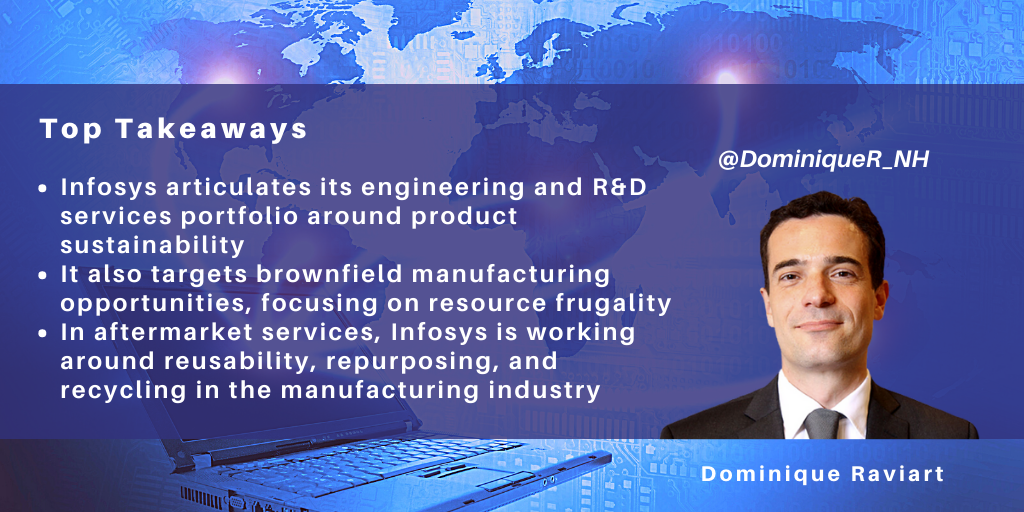posted on Oct 27, 2022 by Dominique Raviart

We recently talked to Infosys about how its Engineering and R&D services portfolio addresses sustainability and the circular economy, given the strong client interest in sustainable product design.
Infosys has accordingly evolved its sustainability engineering offerings from a series of capabilities into a portfolio that is articulated along three product lifecycle phases: design & development; manufacturing & operations; and aftermarket services, including product retrofitting and recycling.
Product Design and Development Is Core for Sustainability Engineering
Product and design development is at the core of any sustainability offering. Infosys’ design and engineering experience in this space ranges from energy-efficient products to sustainable products. An example of recent work is a radiant baffle, which Infosys initially designed for its internal needs. The radian baffle cools temperature by removing heat, mainly through heat transfer radiation. Infosys argues that the radian baffle internally reduced per capita energy consumption by 26%. The company points out that A/C equipment accounts for 40-50% of a building’s energy consumption in India, and Infosys is now marketing it externally.
Infosys is also active in designing sustainable products. An example of a recent project is a green scoring dashboard that collects product-related components and parts information. It uses an AI model to determine a ‘green score’ based on the component impact on the environment and health.
Regulatory compliance is an important driver for sustainable product design. Infosys created its full material disclosure (FMD) dashboard designed for the chemicals industry. Chemical suppliers declare on the FMD dashboard the nature of chemicals supplied to the client. Infosys used FMD to identify restricted substances and for reporting purposes.
In another recent project around traceability, Infosys developed a crop transaction application suite for farms in India. The applications start with farm registration, recording the crop transaction and payment, up to the warehouse management and logistics stages, with integration into the ERP systems. The suite thus traces crops across their transaction phases.
Tapping the Immense Brownfield Opportunity
Beyond product design and development, sustainability has immense potential in brownfield manufacturing and operations. In this space, Infosys focuses on resource frugality, primarily around energy consumption and water management. The company draws on its own experience from achieving carbon neutrality in 2020 in its campuses/delivery centers. It monitors, in real-time, equipment such as chillers and HVACs, generators, and elevators, along with sewage and treatment plants. Much of its effort has been collecting data from facilities (through IoT systems), analyzing them, and building predictive models. Infosys now forecasts its energy and resource consumption based on models that include weather and conducts budget deviation analysis.
An example of a brownfield project is with a cable manufacturer that had designed a new electric cable coating that increased electricity transmission by 15-25% and was incorporated into its new product. It wanted to address its client base of aging installed wires (70% are 25 years old). Infosys designed a robot prototype installed on the power lines that take photos to identify dirty and deteriorated areas and then conducts wire cleaning and coating.
IoT has a key role in sustainable manufacturing operations. An example of a project is where Infosys collects data from sensors and equipment on a given production line. Based on the data, the AI models will determine when the production line is not running and, when applicable, turn off the air handling unit, to save energy costs.
Aftermarket Services: Reuse and Recycling Are Next
In aftermarket services, IoT use cases have centered around remote monitoring and predictive maintenance. Other potential use cases include focusing on reusability, repurposing, and recycling.
In aircraft decommissioning, Infosys is working on identifying components that can be resold and reused and triaging the level of recyclability of other components. Regulations in aircraft decommissioning require parts to be identified and traced from decommissioning to reinstallation into a new plane. Infosys is developing a blockchain solution for this. It is also working with SAE International on developing electronic transaction standards for the aerospace industry.
Infosys has largely completed its identification of sustainability capabilities and is now looking to fill gaps in its offerings and develop service repeatability with methodologies and accelerators. Infosys is starting with maturity assessments to help clients understand where they stand in their product sustainability journey and where they need to invest.


